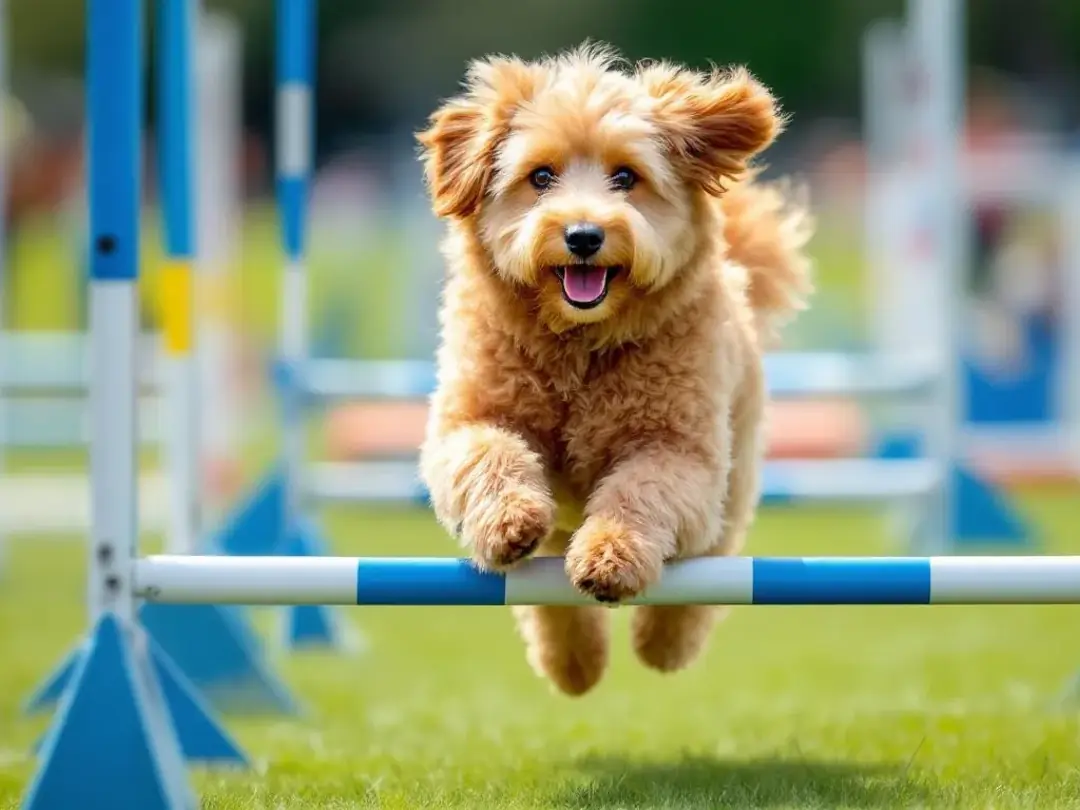Thinking about adding a goldendoodle to your family? You're not alone-this designer dog breed has captured hearts worldwide with their friendly personalities and often low-shedding coats. Goldendoodles are part of a group known as designer dogs, which are intentionally bred hybrids created to combine desirable traits from two purebred parents. But before you fall in love with those adorable curly faces, there's plenty to learn about what makes these dogs tick.
This comprehensive guide covers everything from goldendoodle personality traits to health concerns, grooming needs, and finding reputable breeders. Whether you're a first-time dog owner or adding to your pack, understanding what you're signing up for helps set both you and your future pup up for success.
What is a Goldendoodle?
A goldendoodle is a cross bred designer dog created by combining a golden retriever with a poodle-most commonly standard poodles, though miniature and toy poodles are used for smaller versions. This intentional mixing of two breeds aims to capture the golden retriever's gentle, trainable nature alongside the poodle's low shedding, often hypoallergenic coat. Like other hybrid breeds, goldendoodles are not recognized by the American Kennel Club (AKC) due to their hybrid status, though they may be registered with other organizations.
The story begins in the late 1960s when Monica Dickens, great-granddaughter of the famous author Charles Dickens, first bred these crosses hoping to create guide dogs suitable for people with allergies. While her initial efforts didn't gain widespread attention, the concept took off in the 1990s when breeders began promoting goldendoodles as ideal family pets and therapy dogs.
These dogs come in three main sizes depending on their poodle parent:
-
Standard Goldendoodle: 50-90 pounds, standing 20-26 inches tall
-
Medium Goldendoodle: 30-45 pounds, reaching 17-20 inches
-
Miniature Goldendoodle: 15-30 pounds, standing 13-17 inches
The mini goldendoodle typically weighs around 25 pounds, is well-suited for urban living, and is known for its friendly temperament and low-shedding coat, making it a popular choice for families and apartment dwellers.
The height range varies from 13-24 inches depending on whether the poodle parent was a toy, miniature, or standard poodle. This size flexibility makes goldendoodles adaptable to different living situations, from apartments to sprawling suburban homes.
History and Origins of Dog Breeds
The story of dog breeds is a fascinating journey that stretches back thousands of years. Dogs were first domesticated from wolves, and as human societies evolved, so did the roles of their canine companions. Through selective breeding, people shaped dogs to excel at specific tasks-herding livestock, hunting game, guarding property, or simply providing companionship. Geography, culture, and the needs of different communities all played a part in the development of the diverse dog breeds we know today.
For example, herding breeds like Border Collies were bred to help farmers manage sheep and cattle, while hunting breeds such as golden retrievers were developed to retrieve birds and other game for hunters. The golden retriever, with its friendly temperament and eagerness to please, quickly became a favorite among families and sportsmen alike. On the other hand, the standard poodle, originally bred as a water retriever, is renowned for its intelligence, agility, and low shedding coat.
Goldendoodles are a more recent addition to the world of dog breeds, created by crossing the golden retriever with the standard poodle. The goal was to combine the golden retriever's loyal, energetic, and gentle nature with the poodle's intelligence and low shedding qualities. This cross has resulted in a designer dog that is not only friendly and adaptable but also often better suited for people with allergies. Understanding the origins of goldendoodles-and the traits of their parent breeds-can help pet parents appreciate their unique temperaments and care needs.
Characteristics of a Goldendoodle Puppy
Goldendoodle puppies are the epitome of cuteness, but their appeal goes far beyond their adorable looks. As a cross between a golden retriever and a standard poodle, goldendoodle puppies often inherit the best qualities of both parent breeds. They are typically friendly, outgoing, and eager to explore the world around them, making them a wonderful choice for families with children or other pets.
One of the standout features of a goldendoodle puppy is its high intelligence. These puppies are quick learners and respond exceptionally well to positive reinforcement and proper training. Early socialization and consistent, gentle guidance help goldendoodle puppies grow into well behaved adult dogs. Their playful and curious nature means they thrive on mental stimulation, so interactive toys, training games, and regular exercise are essential for their development.
Goldendoodle puppies are also known for their low shedding coats, which can be a major advantage for people with allergies. However, their fur does require regular grooming to prevent mats and tangles, especially if they inherit the curlier coat of their poodle parent. Establishing a grooming routine early on helps keep their coat healthy and comfortable.
When searching for a goldendoodle puppy, it's crucial to work with reputable breeders who prioritize the health and well-being of their breeding stock. Responsible breeders perform health testing on both parent breeds to reduce the risk of inherited health issues and provide support as you welcome your new puppy home.
Goldendoodle Personality and Temperament
The goldendoodle personality typically combines the best traits of both parent breeds, resulting in intelligent, friendly, and highly trainable companions. These dogs inherit the golden retriever's patient, gentle nature and the poodle's sharp intelligence, creating pets that excel with children, elderly family members, and other pets when properly socialized.
Most goldendoodles are energetic and playful, requiring 30-60 minutes of daily exercise to stay mentally and physically satisfied. Goldendoodles tend to have a longer lifespan and calmer energy levels compared to some other doodle breeds, making them especially appealing for families seeking a steady companion. They thrive on interaction and can develop separation anxiety if left alone for more than 8 hours regularly. This attachment to their families makes them excellent therapy dogs and emotional support animals, but it also means they're not the right fit for households where everyone's gone all day.
Their patient and gentle temperament, combined with high intelligence from both parent breeds, makes them natural candidates for service dogs and therapy work. Many goldendoodles excel in these roles, though individual dogs vary in their suitability for specialized training.
The key to a well-balanced goldendoodle personality lies in early socialization and consistent training. These dogs are people-pleasers who respond beautifully to positive reinforcement, but without proper guidance, their intelligence can lead to creative problem-solving you might not appreciate-like figuring out how to open cabinets or gates.


Exercise and Activity Needs
Don't let their teddy bear appearance fool you-goldendoodles need substantial daily activity to stay happy and well behaved. Plan for 1-2 hours of physical activity daily, including walks, runs, and active playtime. This isn't just about burning energy; it's about meeting their mental stimulation needs too.
These dogs excel in various dog sports thanks to their athletic golden retriever heritage and agile poodle genetics. Consider activities like agility training, dock diving, rally obedience, or even hunting activities. The poodle parent brings water dog heritage, making swimming an excellent exercise option that's easy on joints.
Mental stimulation prevents destructive behavior just as much as physical exercise. Interactive toys, puzzle feeders, and regular training sessions keep their sharp minds occupied. A bored goldendoodle is a creative goldendoodle-and not always in ways you'll appreciate.
Even apartment living can work for goldendoodles if their exercise needs are consistently met. However, this requires commitment to daily walks, regular trips to dog parks, and creative indoor activities during bad weather. Playing fetch in hallways, teaching new tricks, or setting up obstacle courses can help when outdoor exercise isn't possible.
Training Goldendoodles
Start training your goldendoodle puppy as early as 8 weeks old. These intelligent dogs from smart parent breeds learn quickly, but they also pick up bad habits just as fast without proper training and guidance. Good training, based on positive reinforcement and consistency, is essential to prevent behavioral issues and foster a well-adjusted goldendoodle.
Goldendoodles respond best to positive reinforcement methods using treats, praise, and play as rewards. Their eagerness to please makes them excellent candidates for obedience classes, where they can learn alongside other dogs while developing crucial social skills.
Focus your early training on these essential areas:
-
House training: Most goldendoodle puppies catch on within a few weeks with consistent scheduling
-
Leash walking: Start indoors, then progress to quiet outdoor areas
-
Recall: Practice in safe, enclosed spaces before attempting off-leash time
-
Bite inhibition: Crucial during the puppy phase when everything goes in their mouth
To successfully train a goldendoodle, short, frequent sessions work better than marathon training attempts. Their intelligent nature means they get bored with repetition, so keep sessions engaging and varied.
Common behavioral issues include jumping on people, excessive barking, and destructive chewing. The good news? Proper training addresses all of these. Teach "sit to say hi" instead of jumping, provide appropriate chew toys, and ensure adequate exercise to prevent most problem behaviors before they start.
Never use shock collars or harsh punishment with goldendoodles. Their sensitive nature responds much better to positive reinforcement, and harsh methods can damage the trusting relationship that makes training so effective with this breed.


Goldendoodle Health Concerns
With an average lifespan of 10-15 years, goldendoodles can live long, healthy lives when bred responsibly and cared for properly. However, like all dogs, they're prone to certain health issues inherited from their parent breeds. Common health conditions in goldendoodles include joint problems, eye disorders, skin allergies, and other inherited issues, so understanding and preventing these health conditions is crucial for long-term well-being. Choosing reputable breeders who perform comprehensive health testing significantly reduces these risks.
Before bringing home a goldendoodle puppy, ensure the breeder provides OFA hip testing results, cardiac screening, and genetic testing for both parent breeds. Regular veterinary checkups throughout your dog's life help catch potential issues early when they're most treatable.
While hybrid vigor from cross breeding can reduce some health risks, goldendoodles can still inherit health problems from either golden retrievers or poodles. Understanding these potential health issues helps you make informed decisions about care and prepare for possible future needs.
Hip and Elbow Dysplasia
Hip dysplasia involves abnormal development of the hip joint, leading to arthritis and mobility issues over time. This condition affects both parent breeds, making it a concern for goldendoodles despite their hybrid vigor.
Watch for symptoms like difficulty climbing stairs, limping after exercise, or reluctance to run and play. Some dogs show subtle signs like taking longer to get up from lying down or preferring to sit rather than stand during activities.
Treatment options range from joint supplements and weight management to surgical interventions like hip replacement in severe cases. Many dogs with mild dysplasia live comfortable lives with proper care, including maintaining ideal weight and appropriate exercise modifications.
Prevention starts with choosing breeding stock that has passed OFA hip evaluations, but maintaining your dog's health through proper nutrition and exercise throughout life plays an equally important role.
Heart Disease
Subvalvular Aortic Stenosis (SAS) represents the most common heart concern in goldendoodles, involving narrowing of the heart's aortic valve. This condition can range from mild to severe, with serious cases potentially limiting exercise tolerance and lifespan.
Symptoms include exercise intolerance, difficulty breathing during activity, and in severe cases, fainting or collapse. However, many dogs with mild SAS show no obvious symptoms, making cardiac screening essential for breeding dogs.
Reputable breeders should provide echocardiogram results for both parent breeds. While mild cases can often be managed with lifestyle modifications and regular monitoring, severe cases may require medication or surgical intervention.
Regular vet checkups help monitor heart health throughout your goldendoodle's life, especially important as they age and if any symptoms develop.
Eye Conditions
Several inherited eye conditions affect both golden retrievers and poodles, making annual eye exams important for goldendoodles. Progressive Retinal Atrophy (PRA) causes gradual vision loss, eventually leading to blindness, while cataracts create clouding of the eye lens that can also impair vision.
Glaucoma, involving increased pressure within the eye, can cause pain and vision loss if not treated promptly. Early signs include cloudiness, excessive tearing, or behavior changes like bumping into objects or reluctance to navigate in dim light.
Many eye conditions develop gradually, so annual screening by a veterinary ophthalmologist helps catch problems early. While some conditions like PRA have no cure, early detection allows for lifestyle adjustments that help affected dogs adapt.
Genetic testing for eye conditions helps reputable breeders make informed breeding decisions, reducing the likelihood of passing these problems to offspring.
Gastric Dilatation-Volvulus (Bloat)
Bloat represents a life-threatening emergency where the stomach fills with gas and potentially twists, cutting off blood supply. While more common in large, deep-chested breeds, standard goldendoodles can be affected due to their size and build.
Symptoms develop rapidly and include unsuccessful attempts to vomit, restlessness, drooling, and a visibly distended abdomen. This condition requires immediate emergency veterinary treatment-every minute counts.
Prevention strategies include feeding frequent meals rather than one large daily meal, using slow feeder bowls to prevent gulping, and avoiding vigorous exercise immediately before and after eating. Some owners of large goldendoodles discuss preventive gastropexy surgery with their veterinarians.
Understanding the signs and having an emergency plan, including knowing the location of your nearest 24-hour veterinary clinic, can save your dog's life if bloat occurs.
Goldendoodle Grooming Requirements
Professional grooming every 6-8 weeks keeps your goldendoodle's coat healthy and manageable, but daily care at home is equally important. These dogs require regular brushing to prevent matting, especially those with curlier coats inherited from their poodle parent.
Coat types vary significantly depending on which parent breed dominated the genetic lottery. Straighter coats resembling the golden retriever parent need less intensive care, while curly poodle-type coats require daily attention to prevent painful mats and tangles.
Daily brushing works best when you establish a routine early. Use a slicker brush to work through the coat in sections, followed by a metal comb to catch any remaining tangles. Pay special attention to areas prone to matting: behind the ears, under the arms, and around the collar area.
Regular ear cleaning becomes essential due to hair growth in the ear canals-a trait inherited from poodles. Clean ears weekly with veterinarian-approved solution and watch for signs of infection like odor, discharge, or excessive scratching. Goldendoodles are particularly prone to ear infections due to their floppy ears and dense coat, so regular cleaning and monitoring are essential to prevent this common health issue.
Nail trimming every 3-4 weeks prevents overgrowth and splitting, while dental care 2-3 times weekly helps prevent periodontal disease. Many goldendoodles tolerate grooming well when introduced gradually with positive reinforcement.
The cost of professional grooming adds up-budget $75-150 every 6-8 weeks depending on your area and your dog's size. Some owners learn basic trimming techniques to extend time between professional appointments, but complete grooming requires skill and proper equipment.
Feeding and Nutrition
Feed your goldendoodle a high-quality dog food that meets AAFCO (Association of American Feed Control Officials) standards for their life stage. Puppies need puppy formula, adults require adult maintenance diets, and senior dogs benefit from formulations designed for their changing nutritional needs.
Recommended brands with strong reputations include Purina Pro Plan, Hill's Science Diet, and Royal Canin, though many excellent options exist. Focus on the nutritional adequacy statement and ingredient quality rather than marketing claims.
Goldendoodle puppies under 6 months need frequent meals-typically 3-4 times daily-to support their rapid growth and maintain stable blood sugar. Adult dogs do well with two meals daily, which also helps prevent bloat compared to one large meal.
Use slow feeder bowls or puzzle feeders to encourage slower eating, especially important for preventing bloat in larger goldendoodles. These tools also provide mental stimulation during mealtime, turning eating into an engaging activity.
Treats should comprise no more than 10% of your dog's daily caloric intake. Use them strategically for training rather than as frequent snacks. High-value treats like small pieces of chicken or cheese work well for training sessions and special rewards.
Monitor your goldendoodle's body condition regularly by feeling for ribs and watching for a visible waist tuck when viewed from above. Adjust portions based on activity level, age, and individual metabolism rather than relying solely on feeding guidelines on the bag.


Goldendoodle Generations and Coat Types
Understanding generation terminology helps you know what to expect from different goldendoodle crosses. F1 goldendoodles (50% golden retriever, 50% poodle) often have the most predictable temperaments but the widest variation in coat types.
F1B goldendoodles (75% poodle, 25% golden retriever) typically inherit curlier, more hypoallergenic coats due to the higher percentage of poodle genetics. Many families seek goldendoodles as a non-shedding dog option, making them popular among allergy sufferers and those seeking less mess in the home. These crosses are popular with families dealing with allergies, though no dog is 100% hypoallergenic.
F2 generations and beyond become less predictable as genetic traits from both parent breeds can appear in various combinations. Miniature goldendoodles and standard sizes both require regular exercise and mental stimulation, but miniature goldendoodles may be especially well-suited for families with limited space or those seeking a more manageable companion. While some breeders work to stabilize certain traits through multigenerational breeding, early generations often show more variation.
Coat types range from straight (resembling the golden retriever parent) to wavy or tightly curled (like poodles). Curlier coats typically shed less but require more intensive grooming, while straighter coats may shed more but are easier to maintain.
Individual allergy testing is recommended regardless of generation or coat type. Prospective owners should spend time with goldendoodles before bringing one home to assess any allergic reactions and ensure compatibility. While many goldendoodles produce fewer allergens than heavy-shedding breeds, sensitive individuals may still react to any dog, including those labeled as hypoallergenic.
Cost of Owning a Goldendoodle
Initial goldendoodle puppy costs range from $1,500-$5,000 from reputable breeders, with factors like size, generation, health testing, and breeder reputation affecting price. Mini goldendoodles often cost more than standard sizes due to breeding complexity and higher demand.
Professional grooming represents a significant ongoing expense at $75-150 every 6-8 weeks. Annual grooming costs can reach $600-1,200 depending on your dog's size and coat type. Some owners learn basic trimming to reduce costs, but full grooming requires professional expertise.
Annual veterinary expenses average $800-1,500 for routine preventive care, including vaccinations, heartworm prevention, flea and tick control, and wellness exams. Budget additional funds for unexpected health issues, especially as your dog ages.
Quality dog food costs $600-1,200 annually depending on your goldendoodle's size and the brand you choose. Larger dogs eat more, and premium foods cost more per pound, but they often provide better nutrition per serving.
Additional expenses include training classes ($100-300), pet supplies (beds, toys, leashes), pet insurance (optional but recommended), and potential emergency veterinary care. Many owners find pet insurance helpful for managing unexpected health costs.
Don't forget about boarding or pet sitting costs when you travel, replacement costs for items your puppy might destroy during training, and potential home modifications like fencing if you don't have a secure yard.
Pros and Cons of Goldendoodle Ownership
Pros of goldendoodle ownership include:
-
Generally low shedding coats that work better for many allergy sufferers
-
Friendly, adaptable temperaments that suit most family situations
-
High intelligence making training enjoyable and effective
-
Good longevity with proper care and breeding
-
Versatile size options to fit different living situations
-
Often excellent with children and other pets
Cons to seriously consider:
-
High grooming maintenance requiring professional care every 6-8 weeks
-
Tendency toward separation anxiety when left alone frequently
-
Unpredictable coat traits, especially in early generations
-
Substantial exercise and mental stimulation requirements
-
Higher initial cost compared to many other breeds
-
Popularity leading to many irresponsible breeders and puppy mills
Goldendoodles work best for active families who can provide consistent attention, exercise, and grooming care. They're not low maintenance dogs despite their friendly nature-they require significant time investment for exercise, training, and coat care.
These dogs thrive with owners who enjoy training, don't mind regular grooming expenses, and want an interactive family member rather than an independent pet. If you're looking for a dog that can be left alone frequently or requires minimal care, a goldendoodle probably isn't the right fit.


Finding a Reputable Goldendoodle Breeder
Research extensively before choosing a goldendoodle breeder, as the breed's popularity has attracted many irresponsible operations focused on profit over dog welfare. Look for breeders who provide comprehensive health testing certificates for both parent breeds, including hip and elbow clearances, cardiac screening, and genetic testing for inherited conditions. A reputable breeder will also be transparent about their breeding practices, including whether they breed two goldendoodles together or use a poodle and a golden retriever as parents, and should explain the potential health and temperament outcomes of each approach.
Reputable breeders welcome questions about their breeding program, provide references from previous puppy buyers, and often have waiting lists rather than puppies always available. They should allow you to meet at least the mother dog and provide detailed health records for both parents.
Red flags include:
-
Multiple litters always available
-
Unwillingness to provide health testing results
-
Selling puppies under 8 weeks old
-
Meeting in parking lots or public places rather than their facility
-
Inability to provide veterinary references
-
Excessive focus on profit over puppy welfare
Consider goldendoodle rescue organizations as an alternative to purchasing from breeders. Many wonderful adult dogs need homes, often because their original families underestimated the grooming, exercise, or training commitment involved in goldendoodle ownership.
Visit potential breeders in person when possible to assess the conditions where puppies are raised. Clean facilities, well-socialized puppies, and healthy-looking parent breeds indicate responsible breeding practices.
Ask for contracts that include health guarantees and requirements for returning the dog to the breeder if you can't keep them. Responsible breeders want their puppies back rather than seeing them end up in shelters.
Making the Right Choice for Your Family
Goldendoodles can make wonderful family members for the right households, but they're not the perfect fit for everyone. Their combination of intelligence, friendliness, and often reduced shedding appeals to many families, but the grooming requirements, exercise needs, and potential for separation anxiety require serious consideration.
Success with a goldendoodle depends largely on realistic expectations and commitment to meeting their needs throughout their 10-15 year lifespan. These dogs thrive with consistent training, regular exercise, professional grooming, and plenty of family interaction.
Before making your decision, honestly assess your lifestyle, budget, and long-term commitment to providing appropriate care. Consider fostering through a goldendoodle rescue to experience the reality of ownership before making a permanent commitment.
Whether you choose a puppy from reputable breeders or adopt an adult dog from rescue organizations, take time to find the right match for your family's lifestyle and experience level. The time invested in research and preparation pays off in years of companionship with a well-suited four-legged family member.






